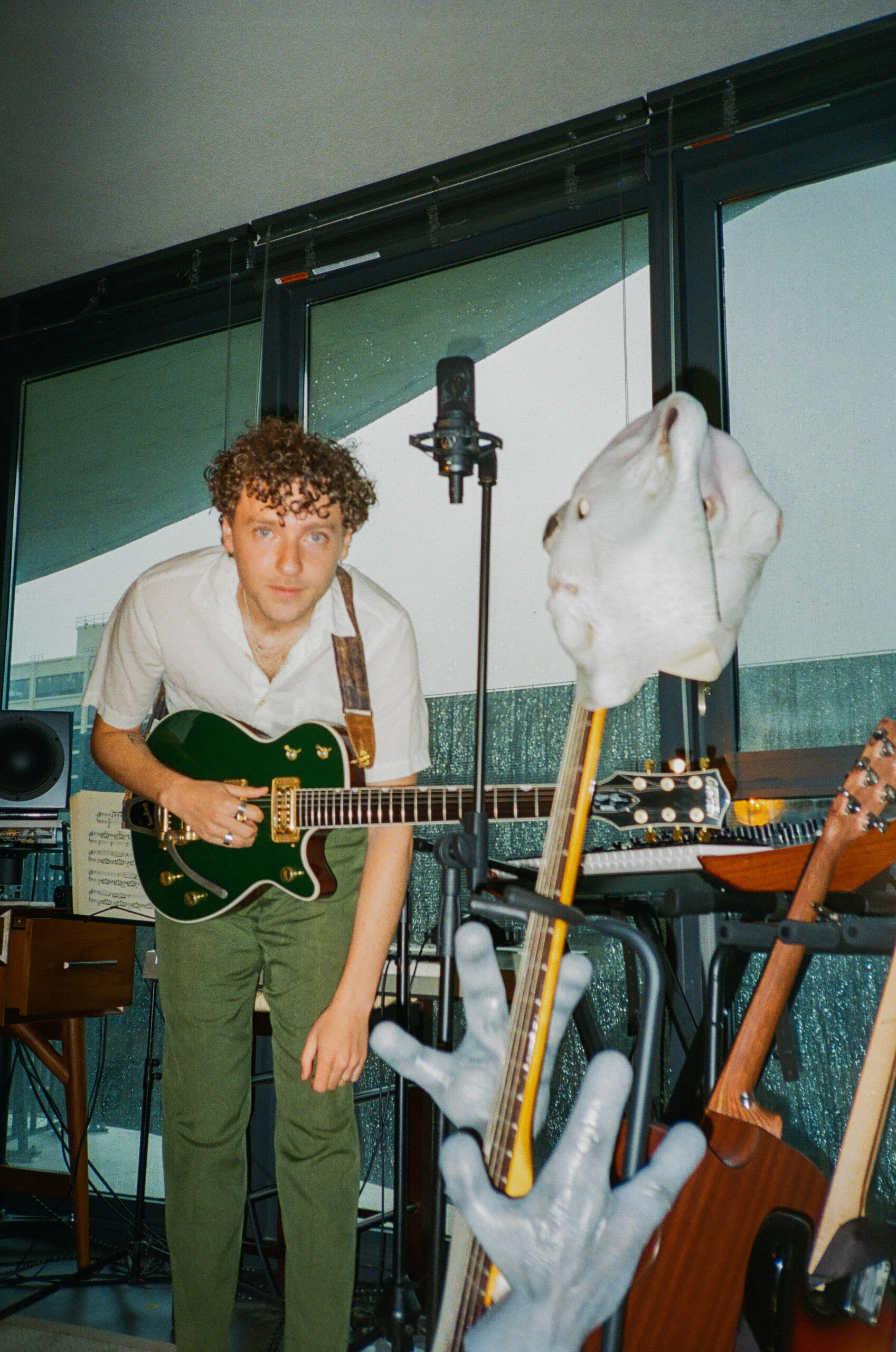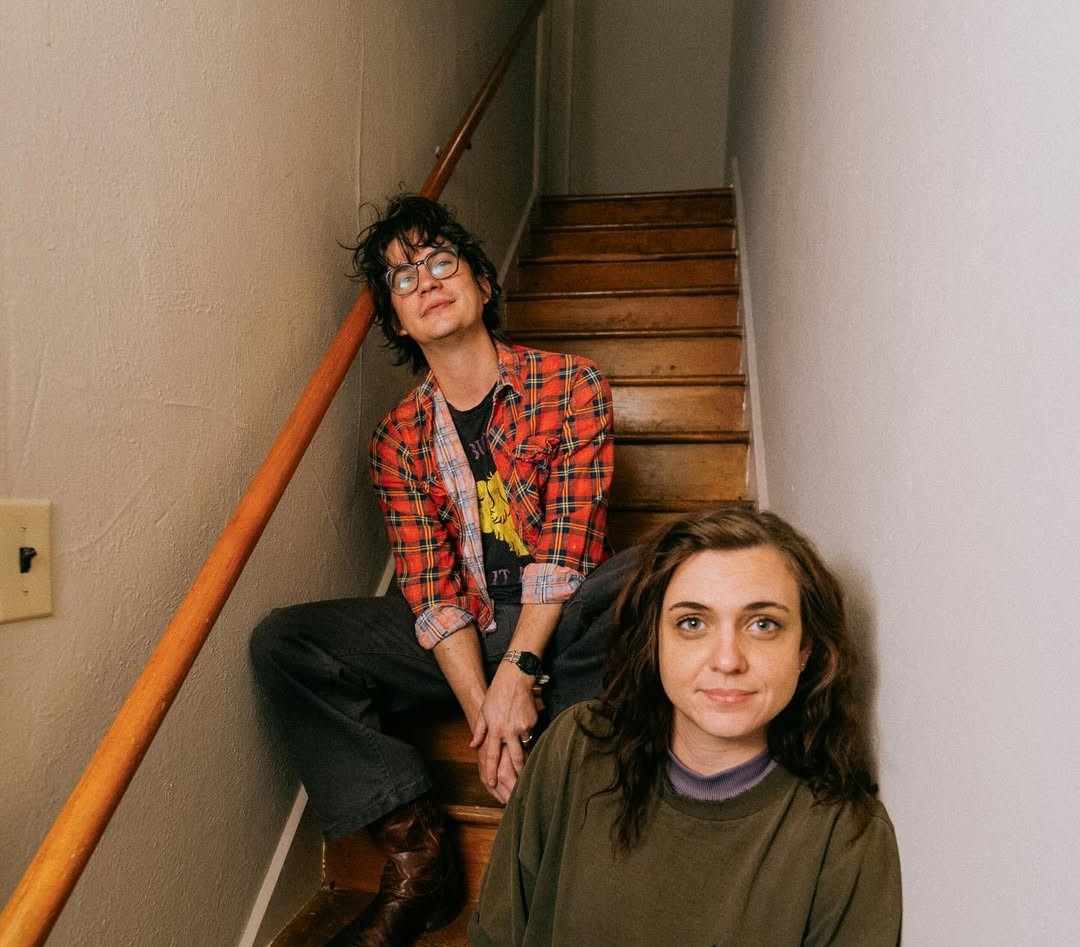Milk Jennings | Interview | New Album, ‘Sleep Talker’
Milk Jennings recently released his debut album ‘Sleep Talker’ consisting of sounds drifting from bright indie rock to darker psych-rock tinged songs.
Milk Jennings was born on a llama farm in Washington State. He spent his childhood playing D&D in the basement and baling hay until he turned 18 and moved east to NYC. He spent 10 transformative years there working as a musician and visual artist before moving to Chicago for two years, and then landing in Seattle in 2021. His debut solo record titled ‘Sleep Talker’ (written in-part in all three cities), born out of a weekly demos project inspired by Japanese Breakfast’s ‘June’ demos, was produced/mixed by acclaimed producer Sam Cohen (Kevin Morby, Alexandra Savior, Danger Mouse, et cetera).
The record is described by Jennings as “impulsive, spontaneous, and uninhibited. Full of childhood memories, adult anxieties, and love – all told in a very nonlinear fashion”. Additional instrumentation includes flute by acclaimed flutist and saxophonist Cochemea Gastelum (Beck, St. Vincent, The Roots, et cetera) and backup vocals by Brianna Leary. The record is inspired by an eclectic mix of decades and modern indie rock – from 60’s psych-rock and The Velvet Underground, to 70’s soft rock like Dan Fogelberg and Bread, to modern acts such as Andy Shauf, Rostam, and Sam Evian.
‘Sleep Talker’ is available via a joint label effort by Telefono and Org Music on limited edition milky clear color vinyl.
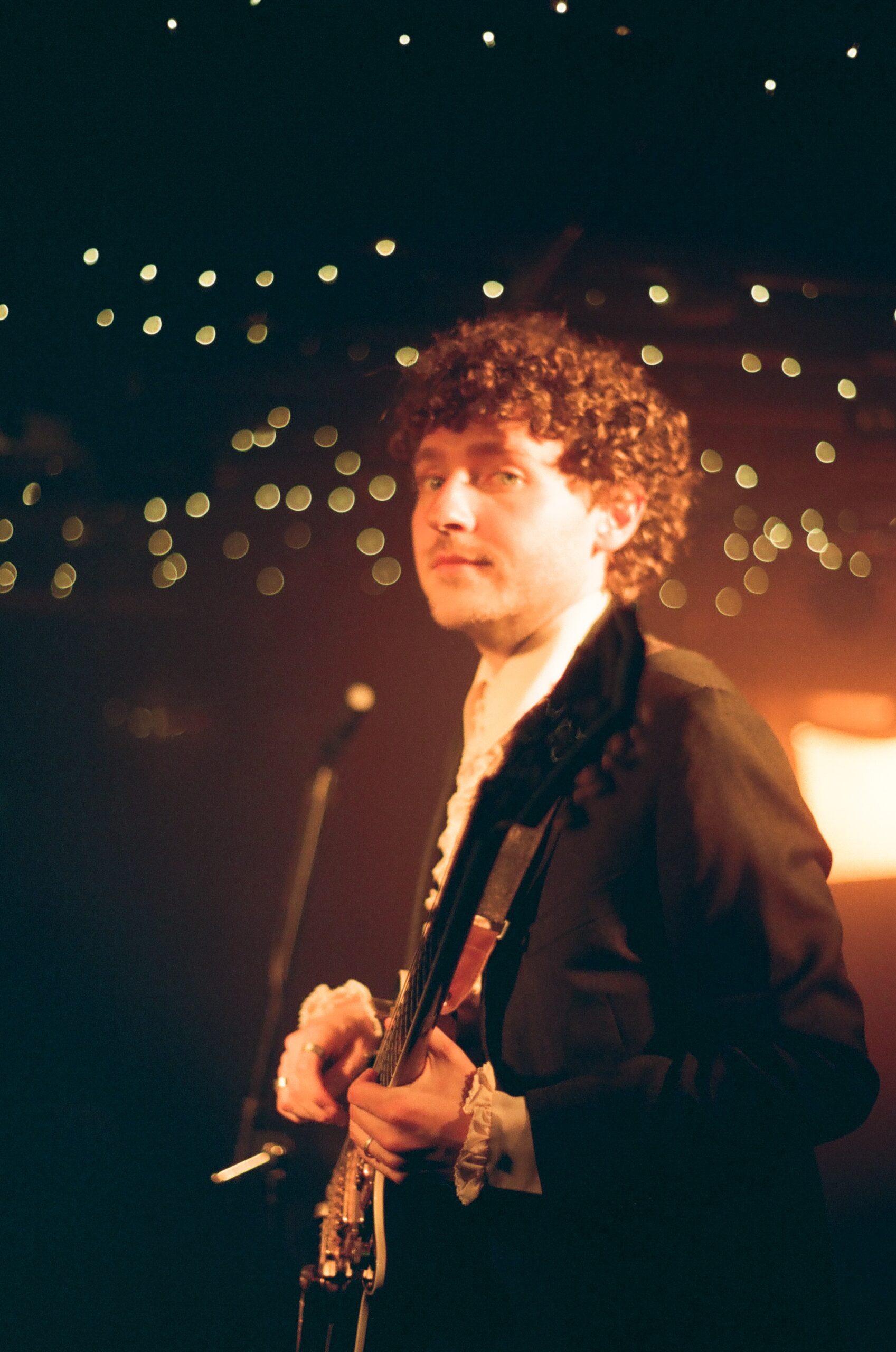
“I don’t set out to write a song, I just start to experiment”
You have a brand new album out, ‘Sleep Talker’. How long did you work on it and can you share a few words about the Milk Jennings project and how it came around?
For sure. Milk Jennings came about when I left NYC after spending 10 years there. The band that I was really invested in at the time broke up, and I was searching around for what to do next. I’ve always been a writer and bedroom recording enthusiast, and was moving to a city where I knew no one, so it felt natural to start a solo project. I was also struggling with my relationship with music at the time, taking things too seriously, had unhealthy perfectionism tendencies, and I was losing that youthful wanderlust and excitement that made me fall in love with music in the first place. So I actually started releasing really imperfectly raw, rough demos onto Bandcamp, and was writing a song a day – in an attempt to reorient myself and force myself to be ok with imperfection. I wanted to be secure with putting something out that wasn’t “perfect”, or “right” or “industry standard”. And I think you can feel that on the album even. Long story short, Milk Jenning has been like a vessel for reorienting myself and rediscovering my original love for music. A new focus. A rebirth, to be dramatic, haha. I then sent the demos to Sam Cohen (my favorite producer) on a whim and he really loved them. That was a huge unexpected shock. We agreed on a 10 song album, worked remotely, and finished the album within a couple months.
The album sounds really good. It was produced and mixed by Sam Cohen (Kevin Morby, Alexandra Savior, Danger Mouse). Are you happy with the production? Can you share some further words about what was the process to get it done?
Thank you! Yeah I’m very happy with the production. And I’m so honored and still blown away that I got to work with Sam Cohen. He’s the best! We worked remotely, so we started by picking 10 or so demos we both liked. I’d send Sam the stems for two or three songs at a time – some of the demos were just vocals and guitar (like ‘Everyday’, ‘Raincoat’, and ‘Late Night’), while others had more of my production (like ‘Side of the Street’ and ‘Head Talk’). I thought he would scrap a lot of my production on those songs, but he actually kept a lot of it! Parts of me wanted him to scrap it all though (haha) because his production is so good and tasteful. But he still added a lot of flavor through his mixing, drum sounds, et cetera on those few songs. For a majority of the songs though, Sam would take my guitar and vocal demos, and fill the rest of the song out entirely. He played all the drums and percussion, most of the bass, a lot of the keys, guitar, et cetera. It was a very classic songwriter / producer collaboration, which I had never experienced, and really enjoyed. Sam worked extremely fast, which was amazing to witness from afar. I’d give him a demo, and the next day or two he’d send me this fully produced song and I’m like “how did you do that”, haha. I’d then maybe record one or two little parts, or revise a vocal part here or there. But for the most part, we used most of my demo vocal takes. I’m not really into editing lyrics much. I like improvisation, and the “demo style” of singing, like no one is listening. And the way Sam played drums, bass, et cetera felt pretty spontaneous, so the whole record has a live performance feeling to it. There were little to no revisions during mixing. So once the first pass mixes came from Sam, we were like, “alright, this is done”. We didn’t fuss over things. We sent it off to the amazing D. James Goodwin for mastering. I did all the cover art, single art, and animated most of the music videos myself. I’m a motion graphics animator outside of music. It took a ton of time, but we had a year lull in between finishing the album and starting the album campaign. So I was able to spend a whole year working on those four music videos.
What’s the usual creative process for you like when it comes to songwriting?
So varied! I really follow my instinct most of the time. I don’t set out to write a song, I just start to experiment. Whether it’s a melody, or a keyboard part, guitar part, et cetera. I usually am recording into a DAW, and have my studio wired up to move between instruments quickly. Sometimes I’ll sit with an acoustic on the couch with my phone memo recording and just noodle around. Once I find something that really grabs onto me, I’ll start to think about structure. A lot of artists talk about this, but there is a flow to creativity, like a river, and I’ve really tried to stop swimming against the river and let the current take me wherever it leads.
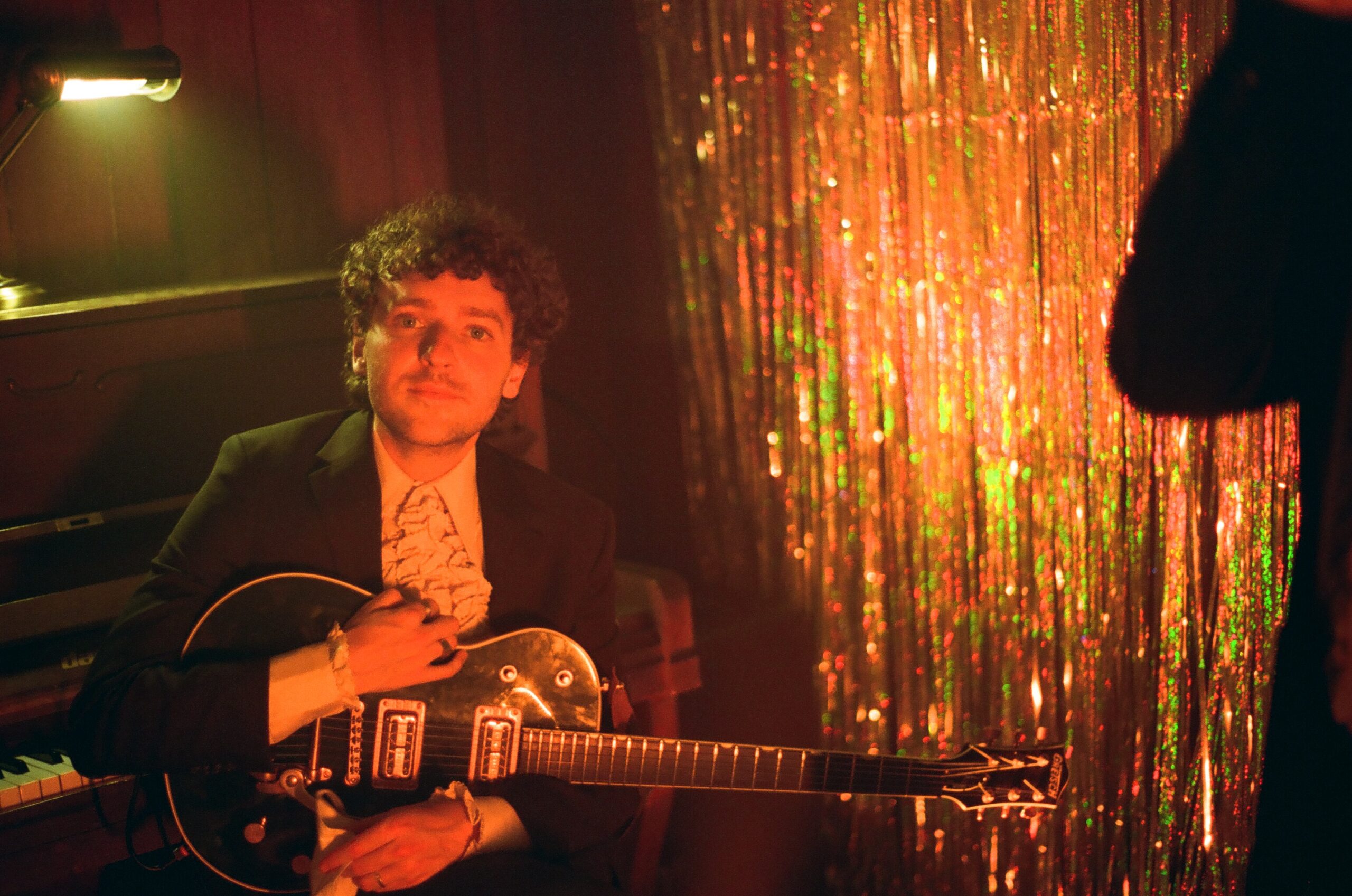
Have you ideas that refuse to step through the door with you? And what do you do with those sketches?
Definitely. I store them in a graveyard on a hard drive. Hundreds of them. I revisit that graveyard weekly when I’m lacking inspiration and will usually come across something that re-excites me to get me going.
Together with Cohen you are performing pretty much all the instruments with exception of flute that was done by Cochemea Gastelum (Beck, The Roots, St. Vincent), and backup vocals by Brianna Leary.
Correct! It was so cool to make this album with just the two of us. Sam is so amazingly skilled at every instrument, so it was a luxury to work with him because we didn’t need anyone else. I also play most of the basic “band” instruments besides drums, so it was nice to contribute some bass here and there, keys, guitar, a little saxophone, et cetera. I think the only guitar solo I played was Side of the Street. The rest are all Sam!
Sam brought in Cochemea to play flute on Raincoat, which was a treat. Cochemea recorded his flute parts remotely as well, and then Sam mixed them in. And then we knew we wanted some female backing vocals on Late Night. My friend Brianna Leary has been a long time collaborator of mine, and so I reached out. She has a very silky smooth voice that works well in so many places.
“My music is definitely based more on a feeling rather than content”
Would you say there’s a certain concept or creed when it comes to your songs?
There isn’t a concept for the most part. My music is definitely based more on a feeling rather than content. And then given my more subconscious and improvised lyric writing process, it’s harder to draw central themes out. But there are a few songs about my life partner, like ‘Everyday’, where I’m singing about these small but wondrous everyday moments with her. They’re not linear, but there’s a central idea. Each song has a little bit of that. Late Night is about memories with best childhood friends. That song probably has more narrative than all the others. Songs like ‘Raincoat’ are more gibberish, and the sounds of the words, melody, inflection, et cetera are more important.
The album itself is quite diverse in its sound mixing indie rock with darker psych rock. Was this something that was spontaneously done or has this been an original idea behind the album making?
That’s a good question. It was done more spontaneously I’d say. Sam is known for some of his production style leaning more experimental, and to generalize, psych. I’m a big fan of experimentation and so I knew Sam would inject the music with a lot of cool sounds. So actually, the song ‘Someday Sunday’ was one of the last songs I wrote midway through working with Sam. I wanted a jammer on the album, especially after the way ‘Raincoat’ and ‘Sherry’ turned out, being darker. I was like, yeah, I think more somber songs will fit on this album. So I wrote ‘Someday Sunday’, sent it to Sam, and told him to make it a long jammer. In general, I’d say not too much was planned with this album. Which is why it was such an enormous breath of fresh air for me. So different from previous albums where I tended to belabor over every little detail. Music making can be intense, and that’s not always a bad thing. But… I loved our free flowing, spontaneous process so much with this album.
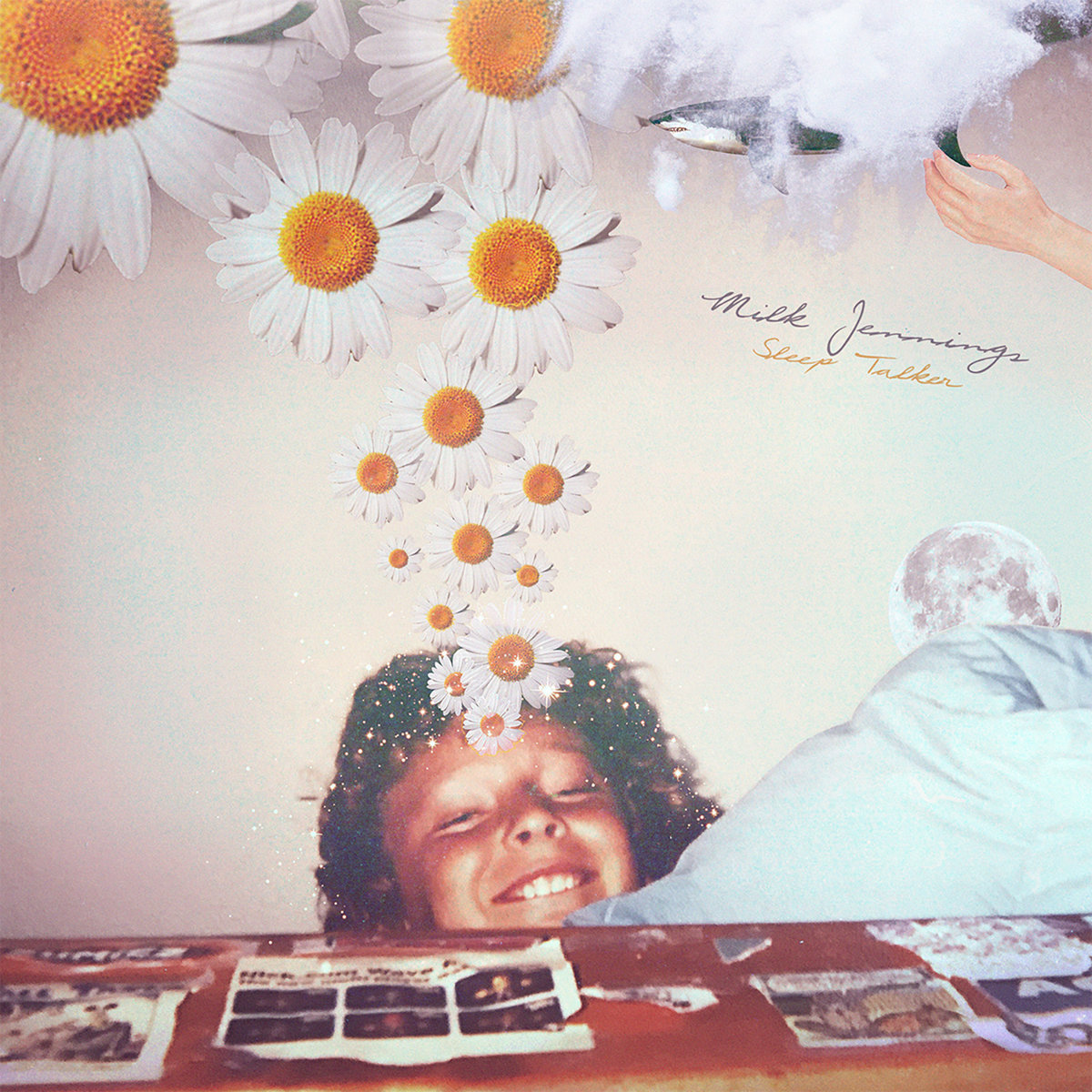
“Melody is king for me”
A peek into your creative process please, digital or analog? Is your approach to laying down music a building block process?
I can’t speak to Sam’s process as much (which is half of the ‘Sleep Talker’ album basically) – but I know he used Pro Tools for the whole thing. I recorded a lot of my demos into Logic Pro. I use some really basic but solid preamps from FMR Audio at my home studio. I recorded all the lead vocals into an RE20, or SM57. And most of my rhythm guitar is with my Gretsch Duo Jet into my Vox AC15 using a SM57 and FatHead ribbon mic, or DI. Some of the synth sounds are from my Korg Prologue. As for my approach to building a song, it can really vary, but I don’t often write whole songs all at once. I usually write a verse, or chorus, and find the vibe that feels special. I’ll then build around that. Though, some songs like ‘Late Night’, ‘Everyday’ and ‘Raincoat’ were written more fully formed. ‘Late Night’ was written within an hour or so. It was one of those quick songs where everything falls into place. I wish I had more of those haha. For building out the structure, I usually follow the melody. See where it wants to go, and then do the same for the chords underneath. Melody is king for me. If I get stuck, there are some simple theory tricks to help guide a progression/melody in a direction you want. That’s helpful. I’m not someone who thinks you need to know music theory to write music. But it is a helpful toolbox to have when you get stuck. Developing instinct is best I think. Maybe. Who knows!
Are you involved in any other bands or do you have any active side-projects going on at this point?
I do! I have this project which I like to keep separate from Milk Jennings, because we have alter egos. Haha. But I’m a part of a duo Chinese art-pop-rock project called Chinese American Bear. We sing in Chinese, and everything has a comedic flair to it. We released a few songs just for fun, and they ended up doing well. We then got signed to one of China’s largest record labels, which in turn signed Milk Jennings. It’s been a really exciting project, and great for sharpening my skills because I produce, engineer, and mix everything myself. We’re a total DIY band. Here’s a music video if you’d like to indulge!
Let’s end this interview with some of your favourite albums. Have you found something new lately you would like to recommend to our readers?
Favorite recent albums I’ve discovered are ‘Vigil’ by The Easybeats from 1965, and Scott McKenzie’s ‘The Voice of Scott McKenzie’ from ‘67. Modern albums I’ve been spinning recently are The Murlocs ‘Young Blindness’, Michael Nau ‘Michael Nau & The Mighty Thread’, and Pond’s entire discography. Haha. Pond has really taken me recently.
Thank you. Last word is yours.
Thanks for your time Klemen. I love what you all do, and am honored to speak about the album with you, and for your readers. You can support me by buying vinyl over at Org Music, and go stream the album if you haven’t! Very proud of this debut album, and am excited to make more. Big love to US labels Telefono and Org Music for supporting me.
Klemen Breznikar
Headline photo: Athena Merry
Milk Jennings Instagram / Bandcamp / SoundCloud / YouTube
Org Music Official Website / Facebook / Instagram / Twitter / Bandcamp / YouTube
Telefono Official Website / Facebook / Instagram / Bandcamp / SoundCloud

